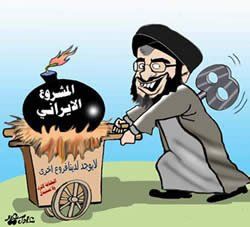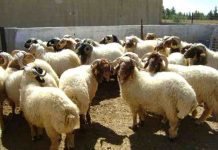Why a new US law has Nasrallah riled
Alex Rowell/Now Lebanon/December 23/15
Banks have already begun action against Hezbollah members in anticipation of toughest financial sanctions yet.
Anyone watching Hezbollah Secretary-General Hassan Nasrallah’s televised address Monday evening – one day after Israel’s assassination of renowned Hezbollah operative Samir Kuntar in Damascus – in the hopes of a lengthy and emotive eulogy of the slain militant was to be disappointed.
In the event, Nasrallah devoted less than half of his address to the man who was given a rock star’s reception in Beirut’s southern suburbs upon his release from Israeli prison in 2008, recounting just one anecdote of their time together and contenting himself, when declaring the party’s reaction to his killing, with reading matter-of-factly from the transcript of his January speech following Israel’s targeting of a joint Iranian-Hezbollah convoy in Syria’s Quneitra.
Instead, the subject that earned most of Nasrallah’s attention – and irritation – in the speech was a new law passed by the US Congress last week (signed by President Obama on Friday) mandating the toughest American sanctions yet on Hezbollah, any organization or individual affiliated with it, and any financial institution anywhere in the world that “knowingly facilitates a transaction” for them. Raising his voice, Nasrallah called on the Lebanese state to “be men” and refuse to comply with the new law, even while claiming at the same time that Hezbollah “will not be harmed at all” by it, since the party has “no money in Lebanese banks [….] does not transfer money in Lebanese banks […] [and] has no trading companies or partnerships in any Lebanese or non-Lebanese companies.”
Whether or not that is true of the party as an organization – and economists told NOW of their deep skepticism – it is plainly not true of many of its members as individuals. The Lebanese As-Safir newspaper, regarded as broadly sympathetic to Hezbollah, reported Wednesday that banks have in fact already begun taking measures against Hezbollah members, including parliamentarians. “One of the large banks,” the paper said, tried last month to close a current account through which a Hezbollah MP received his salary, prompting the personal intervention of Parliament Speaker Nabih Berri and the issuing of a “serious warning” to the bank “that the Resistance ‘will be forced to defend itself against anyone coming to confront its people’.” The case was one of several “similar occurrences,” the paper added.
“The sanctions will have a significant impact on the individuals and institutions close to Hezbollah,” said Qassem Kassir, an analyst of Hezbollah who previously worked for the party-affiliated Al-Manar TV. “It will impact the party’s institutions […] any person charged with formal or informal links to the party [will find] their businesses and money under strict restrictions, and will be placed in a very difficult situation.”
Indeed, Al-Manar itself was singled out by Congress in the new law, which theoretically will sanction any bank providing current accounts for the TV station’s employees’ salaries (or, for that matter, carrying out financial transactions of any kind with the company). Kassir told NOW the “Al-Manar administration took measures a long time ago to avoid such problems,” but was unable to provide details.
One way the party may have got around the problem in Al-Manar’s case, to which it may have to resort more extensively now, is simply conducting financial transactions in cash or other means outside of the official banking system, economic analysts told NOW.
“The bancarization rate [proportion of the population using formal banking services] in Lebanon is not necessarily that high in all parts of the country,” said Thomas Schellen, regional editor of the Executive business magazine. “People can go back to older systems of payment that need not involve banks.”
This informal economy, which Schellen estimates comprises between 20 and 30 percent of the Lebanese economy overall, will thus be a key refuge for the party in evading the new sanctions. Another will be counting on them not to be implemented or enforced in full, which Schellen told NOW is often the case.
“There have been a number of laws [in the US] targeting institutions linked to Hezbollah,” he told NOW. “Every time the measures increase, they make things more difficult [for the party], but they don’t have a total, sweeping impact.”
And, needless to say, Hezbollah has its own ways of dissuading institutions from fully enforcing the sanctions, as the As-Safir article made clear, and as Nasrallah himself reminded the public in his speech Monday.
“I don’t request that the Lebanese state or any of its institutions protect Hezbollah, or its weapons, or its money […] we protect ourselves.”“And we know how to protect ourselves.”
Alex Rowell tweets @disgraceofgod/Amin Nasr contributed reporting.
https://now.mmedia.me/lb/en/reportsfeatures/566413-why-a-new-us-law-has-nasrallah-riled























